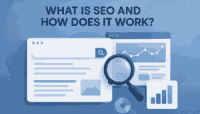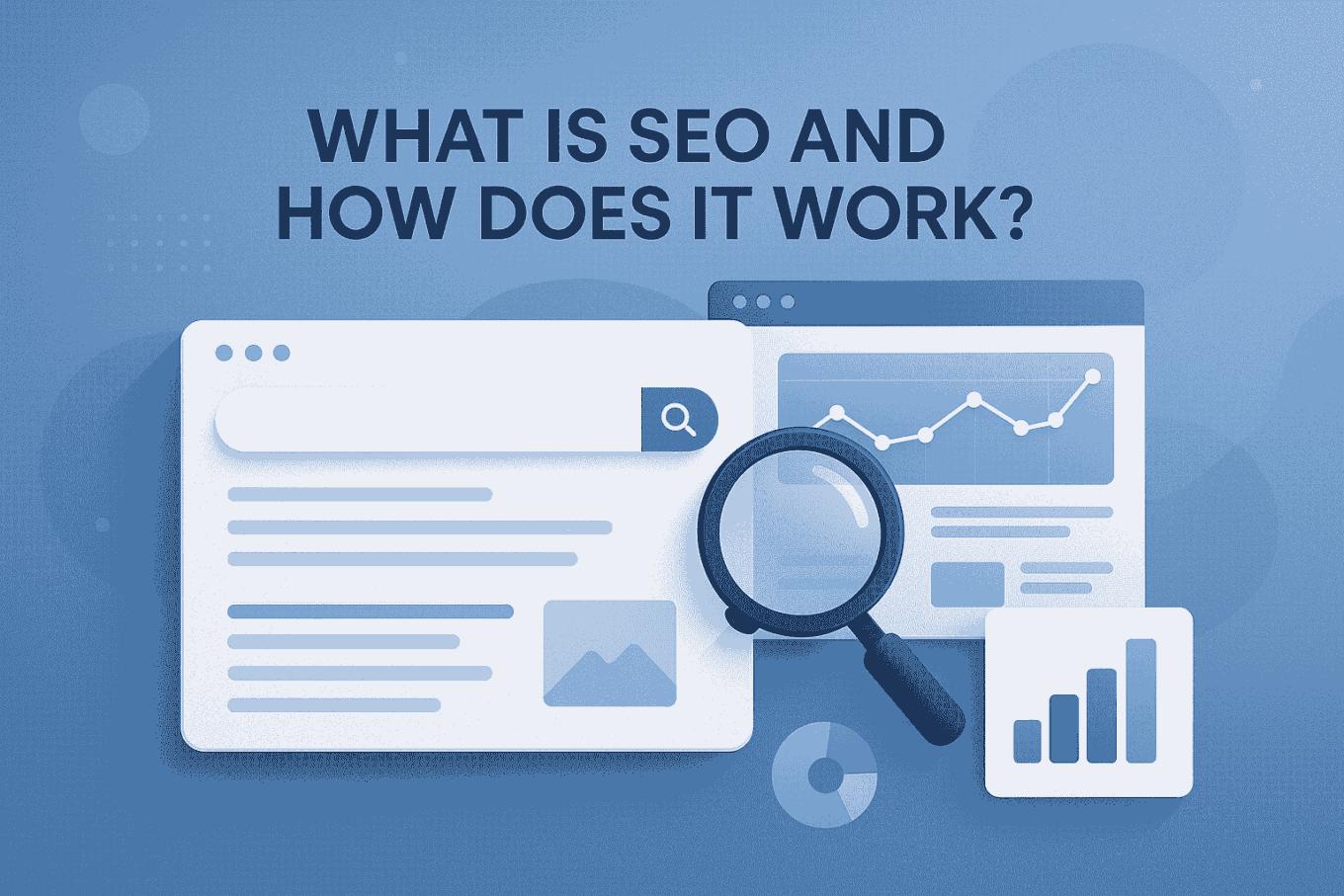Search Engine Optimization (SEO) is the process of optimizing websites and content to improve their visibility on search engines like Google. When users type queries into search engines, algorithms analyze indexed pages to show the most relevant results. SEO helps websites appear higher in these results, thus increasing organic traffic. It involves on-page, off-page, and technical strategies that align with Google’s ranking criteria.
In my experience working with both small businesses and enterprise clients since 2016, implementing SEO correctly can dramatically increase web traffic and lead conversions. It’s not just about keywords; it’s about delivering value to users in a technically sound and content-rich format.
Why Is SEO Important for My Business?
SEO is crucial because most online experiences begin with a search engine. If your business isn’t ranking on the first page of Google, it’s missing out on potential leads and revenue. According to Google, over 90% of web traffic goes to websites on the first page of search results.
I’ve seen firsthand how businesses can go from invisible to industry leaders just by optimizing their site for relevant search terms. SEO also builds brand credibility and offers long-term ROI compared to paid ads.
SEO vs. PPC: What’s the Difference?
SEO focuses on organic traffic while Pay-Per-Click (PPC) advertising drives paid traffic. SEO efforts take time but offer sustainable growth. PPC provides immediate results but requires ongoing investment. Both have their place, and many successful campaigns use them in tandem.
From working with clients in 2024, I observed that PPC works well for product launches or seasonal promotions, while SEO is ideal for ongoing brand visibility and authority.
When Should I Choose SEO Over PPC?
Choose SEO when you aim for long-term results, want to build brand authority, or have a limited ad budget. Opt for PPC if you need instant traffic or are promoting a time-sensitive offer. A balanced approach often works best.
For instance, one of my SaaS clients used PPC to drive leads initially, while we built an SEO foundation in parallel. Within 8 months, organic leads outpaced paid ones, reducing customer acquisition costs significantly.
How Long Does It Take to See SEO Results?
SEO is not instant. Typically, noticeable improvements can be seen within 3 to 6 months, depending on your industry and competition. Google’s algorithms reward consistent and quality content over time.
As of 2025, due to frequent algorithm updates, patience and strategic adaptability are more important than ever. Continuous optimization is key to maintaining rankings.
What Are the Main Types of SEO?
- On-Page SEO: Optimizing content, titles, and HTML elements.
- Off-Page SEO: Building backlinks and improving site authority.
- Technical SEO: Enhancing site speed, mobile-friendliness, and crawlability.
- Local SEO: Targeting local searches and Google My Business listings.
What Are Keywords and Why Do They Matter?
Keywords are the words and phrases people type into search engines. They matter because search engines use them to determine page relevance. Incorporating them naturally improves a site’s visibility for related queries.
In SEO strategy, keyword research tools like Google Keyword Planner and Ahrefs are essential. In 2024, search engines also consider user intent, so semantic and long-tail variations are equally important.
How Do Search Engines Rank Websites?
Search engines rank websites using complex algorithms that evaluate over 200 factors. These include content quality, mobile usability, page speed, domain authority, backlinks, and user experience.
Google’s Helpful Content Update in late 2024 emphasized experience-driven, people-first content. Websites that demonstrate expertise and trustworthiness are ranked higher.
What Is On-Page SEO and What Does It Include?
On-Page SEO involves optimizing elements on your website such as:
- Title tags and meta descriptions
- Header tags and content structure
- Internal linking
- Keyword placement
- Image alt text
This helps search engines understand your content and index it appropriately. Tools like Yoast SEO and RankMath can simplify these processes.
What Is Off-Page SEO and Why Is It Important?
Off-Page SEO refers to activities outside your website that impact your rankings, primarily backlinks from other websites. Quality backlinks act as endorsements, signaling trust to search engines.
In my professional practice, a strong backlink from a trusted site like Google News or Forbes can elevate rankings significantly.
What Is Technical SEO and How Does It Affect My Site?
Technical SEO ensures that your website meets the technical requirements of modern search engines. It includes aspects like:
- Mobile optimization
- XML sitemaps
- Robots.txt configuration
- HTTPS security
- Core Web Vitals performance
Failing to address technical SEO can limit your site’s visibility regardless of content quality.
How Does Content Marketing Relate to SEO?
Content marketing and SEO go hand in hand. Valuable, informative content attracts traffic, earns backlinks, and encourages engagement. Effective SEO amplifies this content’s reach through strategic optimization.
In 2025, content that demonstrates real-life experience and addresses user intent tends to outperform generic material.
How Do SEO Tools Help in Optimization?
SEO tools provide insights and data to make informed decisions. Popular tools include:
These tools help monitor rankings, analyze competitors, perform audits, and identify keyword opportunities.
How Do I Measure SEO Performance and ROI?
Key metrics to track SEO performance include:
- Organic traffic growth
- Keyword rankings
- Conversion rates
- Bounce rate
- Domain authority
Tools like Google Analytics and Search Console are essential for this. Calculating ROI involves comparing revenue generated from organic channels versus SEO investment over time.
What Are the Common SEO Mistakes to Avoid?
Frequent SEO mistakes include:
- Keyword stuffing
- Duplicate content
- Neglecting mobile optimization
- Ignoring site speed
- Lack of internal linking
In my audits, I often find that even reputable businesses overlook basic elements like broken links or unoptimized images.
How Do I Choose the Right SEO or PPC Agency?
Choose an agency with a proven track record, transparent reporting, and a tailored approach. Ask for case studies, check client testimonials, and ensure they adhere to Google’s Webmaster Guidelines.
Experience is crucial—avoid agencies that promise #1 rankings overnight. A trustworthy partner will educate you and work collaboratively toward sustainable growth.



